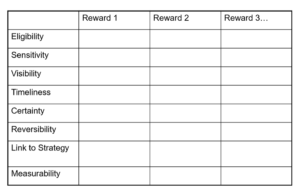
When people in organizations talk about their incentive systems, inevitably the conversation involves compensation. Often, it stops there. But the wonderful work of Steve Kerr and others demonstrates that many things in your incentive system can influence behavior – well beyond the money.

Money is the least imaginative thing to think about when you consider rewards
Over the years, I’ve been highly influenced by Steve Kerr, who worked with both GE and Goldman Sachs and is absolutely brilliant on the topic of how to change behavior in an organization. As he points out in a recent interview, designing an effective rewards system means that leaders need to define, measure and reward performance. It’s critically important to have clear, shared, agreed upon, overarching goals, otherwise you have no idea what behavior you are trying to prompt.
Kerr’s research has shown that a predictable number of factors can make a reward more or less powerful in incenting desired behavior. Think of it as ABC – antecedents ? behavior ? consequences. If you want different consequences, you need different antecedents!
Eligibility
The more people who are eligible for an award, the more powerful it is to have company-wide impact. The fewer people who are eligible for an award, the less motivating it is to the broader population. That’s why things like executive stock options are almost de-motivating if only the people at the top have access to them. It also explains the success of companies like CHI Overhead Doors, whose management made every worker an owner and a participant in the benefits when the company was sold. Watch the video – it will bring tears to your eyes.
Visibility
The more visible a reward is, the more other people see that the reward was given, the more power it has. Why else does Mary Kay Cosmetics make such a big deal about walking across the stage for its top salespeople? Or do various companies create leaderboards so people can see how their performance stacks up against others? A reward given in secret or not widely known is fun for the person getting it, but it doesn’t influence anyone else.
Sensitivity
So you pull in a $10 million contract and your hopeless teammate manages to generate a lame $20,000 in sales and you both get the same reward?? Hang on – that’s de-motivating, right? So in an ideal world, you’d like your rewards to be proportionate to the behavior that you’re looking to incent.
Timeliness
This is why “wait till your father gets home” is probably one of the worst reward scenarios ever. By the time Dad arrives back at his suburban palace, the miscreant child has completely forgotten about whatever they did wrong. At home and in business, feedback about behavior needs to be direct, timely and relevant in the moment.
Certainty
“Work hard, my children, and great things are waiting for you once you complete your tasks.” If your boss says that and you believe him or her, you might well pull another all-nighter to get that project across the finish line. But what if that person has a history of getting you to work your tail off and then somehow the reward never materializes? You don’t need to be a psychology expert to realize that you’re quite likely to roll your eyes and let the deadline slip.
Reversibility
So you got a bonus for delivering exceptional performance – awesome! But do you really believe the bonus goes away if you stop delivering? In all too many cases, people come to take rewards as a given without actually having a performance-related relationship. Hello, every seniority program on the planet, ever! And in some countries, giving a bonus means you are required to offer that same bonus in perpetuity. Be forewarned!
Link to strategy
For a lot of people, they have no idea how what they do in their day-to-day connects with the supposed strategy of their organizations. It’s up to the leaders to make it really clear. If an inside sales person can get a customer to add just one more line to the purchase order – that connects with increasing market share! Super simple, and very powerful.
Measurability
We know that people are more likely to be motivated when they have control over how and when they do their work. If you can make their progress measurable and give them control over how to influence the measures, they are far more likely to put in desired effort than if they have no idea what the metrics are or how to influence them. This is an insight that a lot of people in the gaming business have leveraged – people will work really hard to gain a few more competitive points and they can get sucked into the game.
A practical exercise
So here’s how you can put this idea to work. Brainstorm a list of all the things that you think might constitute rewards in your organization. Be broad in your thinking. Consider recognition, access to a desirable asset, training, peer evaluation, time off, ability to work on a fun project, whatever. Once you have your list, make a chart like this one:

Then brainstorm with your team how you might bump up the power of each reward. It can cast your incentive system in a whole new light!
You may not hear from me next week – we’re at the beach (yay) and then our daughter is getting married (yay yay!!). Hope you have the time to fit some fun into your summer as well.
